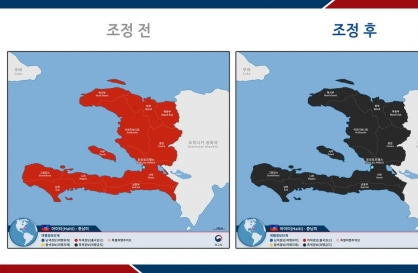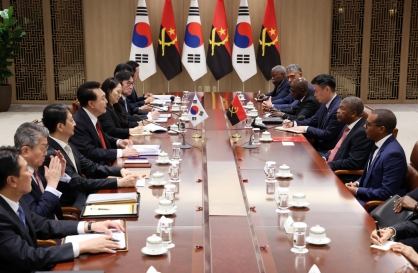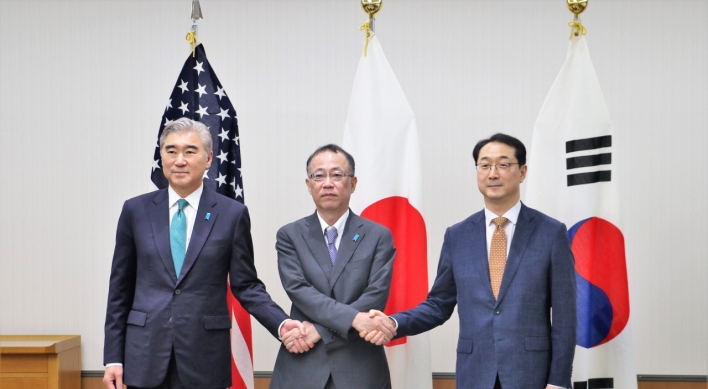‘Distriparks’ at heart of mission to create East Asian maritime hubs
By KH디지털2Published : Dec. 21, 2015 - 17:56
More and more companies are eyeing Korea’s hinterland industrial-commercial complexes, which grant not only geographical benefits for logistics traders but also various tax perks to the residing firms.
The “Distripark” sites, once simply storage or logistics-related locations, are rapidly becoming hot spots for multi-business and residential areas of the seashore.
According to the Ministry of Oceans and Fisheries, more than 145 companies have decided to nestle in the country’s four major complexes -- The Busan Port, Incheon Port, Pyeongtaek Port and the Yeosu-Gwangyang Port complexes -- as of December.
The authorities have held a series of investor relations meeting from November through December with companies from the U.S., China, Europe and Japan, highlighting the various attractions.
The hinterland complexes were first designated in 2005 as a means to enhance the efficiency of the logistics-driven port system.
Aimed at becoming the logistics hub ports of East Asia, the selected ports have the capacity of storing more than 300,000 twenty-foot equivalent units of containers, alongside another 1.5 million TEU of other logistics to deal with every year. They are also capable of expanding sailing routes and creating additional industrial clusters nearby, and their local authorities are ready to help with the administrative affairs.
They are also open to commercial, residential and office facilities, aimed at becoming an all-around financial, R&D, tourist, sales and business district. “In the long term we are planning to develop the Distriparks into marine tourism, port logistics services and urban services complexes to meet with different demands in the region,” an Oceans Ministry official told The Korea Herald.

Busan Port
Busan, the country’s second-largest city by population and the world’s fifth-largest container port, has already become an East Asian maritime hub.
About 60 global carriers operate 368 regular container vessels per week at the port. Global real estate consulting firm CBRE named Busan among the world’s top 20 ports to become the global logistics hub.
In its 9.4-square-kilometer port, about 4.1 square kilometers are dedicated to the Distripark. A total of 68 firms have signed up to nestle in the district, with 55 companies already in operation. They generated more than 244.3 billion won in sales last year.
For foreign firms moving to the Busan Port free trade zone, the Busan Port Authority grants up to 50 years of subsidized rent -- as low as 321 won per square meter a month -- along with a tax deduction package and other benefits.
“The Busan Port’s proximity to China, Japan, Russia and other large markets is a big attraction. You can reach 60 cities with a population of more than 1 million within a three-hour flight. Once we have the trans-Siberian railway open, linking Korea all the way to Europe, Busan will become even more important in logistics,” an official at the Busan Port Authorities said.
Incheon Port
The development of the 7.6-square-kilometer Incheon port hinterland complex is scheduled to be completed by 2018. It is within a close distance from Seoul, Incheon International Airport and China, thus establishing a good marine and air logistics link.
“A company that has an LNG base camp was able to run an ice tank using the ultralow temperature generated from the gas storage. Its costs were only 53-69 percent of ordinary electricity-driven ice tank management costs and the company was able to save 60 billion won on initial costs.
“The ice tank is also used to store refrigerated meat, seafood and fruits, and we are expecting that they could be sent to China, Taiwan and other adjacent countries,” an Incheon Port Authority official said.
Yeosu-Gwangyang ports
The Yeosu & Gwangyang Distripark runs 68 regular container vessels to Northeast Asia and Southeast Asia every week.
Located near Hyundai Engineering and Construction, Hyundai Steel, Posco Terminal, Hanjin Logistics and other plants, its free trade zone is fit for firms in high-added-value manufacturing industries such as coating, grinding and others. The port authorities grant real estate leases of up to 100 years with monthly rents as low as 258 won per square meter.
Pyeongtaek Port
The development of the Pyeongtaek Distripark will be completed around 2020. Its proximity to the Samsung, Sony, LG, Mitsubishi, 3M, Ssangyong Motors, Hyundai and other manufacturing plants make it quite an attractive place to invest.
The port authorities grant rent as low as 500 won per square meter alongside various tax deduction packages to foreign firms in the district.
By Bae Ji-sook (baejisook@heraldcorp.com)


















